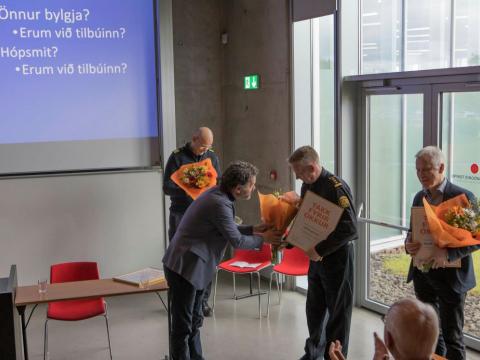No translated content text

The Civil Protection Committee for the Greater Capital Area gathered last Friday to review actions taken by the municipalities’ emergency committees during the height of the Covid-19 pandemic. Dagur B. Eggertsson, the Mayor of Reykjavík and the Chairman of the Civil Protection Committee, opened the meeting with a brief overview of the development of the situation. The meeting was attended by councillors from the municipalities together with municipal emergency officers.
The Mayor took the opportunity to applaud the staff of the local communities for their outstanding work in keeping all essential social services intact while having to reorganize and change their ways of delivering their tasks. He also praised the trinity of Civil Defence, the Director of Health and the Chief Epidemiologist for their invaluable contribution, and their openness and transparency during these extraordinary times.
The Civil Protection Committee for the Greater Capital Area met on 31 January with the Chief Epidemiologist to discuss possible scenarios if the Covid-19 virus would spread to Iceland. The message was clear – all municipalities should commence their emergency committees and activate their contingency plans based on existing strategies of facing international outbreak of influenza. Local authorities were furthermore encouraged to prepare for scaling up their actions from the level of uncertainty to alert phase.
Alert phase was declared on 28 February, when the first Covid-19 case was detected in Iceland, and was upgraded to civil protection emergency phase by 6 March. The emergency phase lasted for 80 consecutive days. During that time, the Civil Protection Committee commenced three times, whereas the Council of Civil Protection held nine meetings. The municipalities and their emergency committees made good use of the time for contingency planning and coordinating their actions, from their first meeting by the end of January until end of February when the first case of Covid-19 was identified. Their strategies were based on existing local and country-wide plans for epidemics. Strong emphasis was placed on cooperation, and the fact that the emergency committees had been activated so early in the process, proved to be of great advantage in the response to the crisis.
Then Þórólfur Guðnason, Chief Epidemiologist, took the floor to cover the challenges Icelanders faced as a nation, and the tasks that we are now confronting as Iceland opens up its borders. Each country has to find out for itself what is sensible, as no nation has the experience of lifting the travel ban in the wake of world pandemic.
According to Þórólfur, it was shocking to see how fast the epidemic spread throughout the country, and equally surprising how quickly the transmission declined. He emphasized the importance of keeping up the good practice by remaining alert and prepared for the second wave of infection, as the borders have now been reopened. There is still no universal certification for confirmed cases of Covid-19, and therefore Iceland will not accept such certificates from other countries. Þórólfur furthermore underlined the importance of opening our borders but staying prepared at the same time.
Chief Superintendent Víðir Reynisson revealed that this was by far the most comprehensive assignment that Civil Protection in Iceland has ever dealt with, as it called for both country-wide as well as international actions. Here we were facing a major health threat of unknown dimension with immense social impact. He felt grateful for the contribution of local authorities and municipality employees, as it is priceless during crisis to work with people capable of using their expertise in solving all problems that may arise.
Jón Viðar Matthíasson, Fire Chief and CEO of the Civil Protection Committee of the greater Capital Area, furthermore underscored the importance of convening the municipalities’ emergency committees so early on in the process. By activating them already by the end of January, all roles were clear and well defined when the crisis hit, which made coordination and cooperation much easier. It was admirable how well the municipalities synchronized their actions during this difficult time, with full support from the Mayors from all six municipalities.
Municipalities’ representatives also addressed the meeting, and stated their appreciation for the useful and earnest information-sharing that continued throughout the crisis. The emergency committees had proven their important role in handling the situation, and the fact that they were activated so early on, had proven to be crucial while addressing the situation.